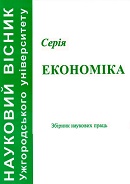ЕКОЛОГО-ЕКОНОМІЧНІ НАСЛІДКИ ВИКОРИСТАННЯ ВІДНОВЛЮВАНИХ ДЖЕРЕЛ ЕНЕРГІЇ
Ключові слова:
відновлювальні джерела енергії, відновлювана енергетика, еколого-економічні наслідки, екологоорієнтований розвиток.Анотація
У цій статті проаналізовані результати досліджень позитивних та негативних еколого-економічних наслідків використання відновлюваних джерел енергії. Розглянуто декілька методів для оцінювання наслідків широкомасштабного використання. Запропоновано узагальнення можливих наслідків упровадження відновлювальних джерел енергії.Посилання
REFERENCES
Al-faruq U., Rianawati E., Sagala S., Currie E. Assessment of Renewable Energy Impact to Community
Resilience in Sumba Island // Resilience Development Initiative. – 2016. – № 9. – P. 3–14.
Apergis N., Payne J. E. Renewable energy consumption and economic growth: evidence from a panel of OECD
countries // Energy policy. – 2010. – Т. 38. – № 1. – P. 656–660.
Chapman C., Ward S. Valuing the flexibility of alternative sources of power generation // Energy Policy. – 1996.
– Т. 24. – № 2. – P. 129–136.
Cho S., Heo E., Kim J. Causal relationship between renewable energy consumption and economic growth:
comparison between developed and less-developed countries // Geosystem Engineering. – 2015. – Т. 18. – № 6. –
P. 284–291.
Evans A., Strezov V., Evans T. J. Assessment of sustainability indicators for renewable energy technologies
//Renewable and sustainable energy reviews. – 2009. – Т. 13. – № 5. – P. 1082–1088.
Fang Y. Economic welfare impacts from renewable energy consumption: the China experience // Renewable and
Sustainable Energy Reviews. – 2011. – Т. 15. – № 9. – P. 5120–5128.
Gagnon L., Belanger C., Uchiyama Y. Life-cycle assessment of electricity generation options: The status of
research in year 2001 // Energy policy. – 2002. – Т. 30. – № 14. – P. 1267–1278.
Inhaber H. Water use in renewable and conventional electricity production // Energy Sources. – 2004. – Т. 26. –
№ 3. – P. 309–322.
Menegaki A. N. Growth and renewable energy in Europe: a random effect model with evidence for neutrality
hypothesis // Energy Economics. – 2011. – Т. 33. – № 2. – P. 257–263.
Moutinho V. Is the share of renewable energy sources determining the CO2 kWh and income relation in
electricity generation? / V. Moutinho, M. Robaina // Renewable and Sustainable Energy Reviews. – 2016. – Т. 65. –
P. 902–914.
Phylipsen G. J. M. et al. Environmental life-cycle assessment of multicrystalline silicon solar cell modules. –
Department of Science, Technology and Society, Utrecht University, 1995.
Sadorsky P. Renewable energy consumption and income in emerging economies // Energy policy. – 2009. –
Т. 37. – № 10. – P. 4021–4028.
Schleisner L. Life cycle assessment of a wind farm and related externalities // Renewable energy. – 2000. –
Т. 20. – № 3. – P. 279–288.
Sheikh N. J., Kocaoglu D. F., Lutzenhiser L. Social and political impacts of renewable energy: Literature review
// Technological Forecasting and Social Change. – 2016. – Т. 108. – P. 102–110.
Stewart G. B., Pullin A. S., Coles C. F. Poor evidence-base for assessment of windfarm impacts on birds //
Environmental Conservation. – 2007. – Т. 34. – № 1. – P. 1–11.
Tiwari A. K. et al. A structural VAR analysis of renewable energy consumption, real GDP and CO2 emissions:
evidence from India // Economics Bulletin. – 2011. – Т. 31. – № 2. – P. 1793–1806.

